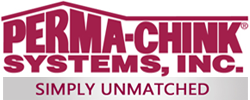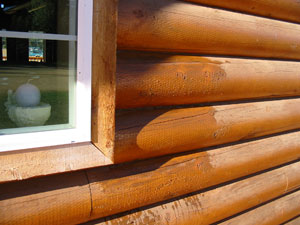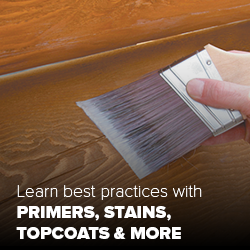 Perma-Chink Systems, Inc
Log & Timber Home Care Experts
Perma-Chink Systems, Inc
Log & Timber Home Care Experts
Perma-Chink Systems have the best stains for log and timber homes. While we tend to call our stains "finishes," most consumers are used to the phrasing of "wood stain." Why the difference? The quick answer is that stains permeate the wood, while finishes form a film over the surface, protecting the wood. If you want to know more about the difference, our tips below can answer your questions.
The Tech Tips are grouped below by how our system works. Like most things in life, success is determined by a strong foundation. So the first section contains information on getting your log or timber home ready for the finish of your choosing. Following the surface prep section, we've consolidated information about our finishes for both exterior and interior. The final section is dedicated to known issues with log and timber homes that all homeowners have to deal with, regardless of which finish they choose.
Wood Finishes Application Guide
Tips For Surface Prepping, Cleaning, & Washing
Tech Tips About Stains & Finishes
Tech Tips For Exterior Finishes
Tech Tips For Interior Finishes
TECH TIP |
|
TECH TIP |
|
| How to Apply Lifeline Interior | Applying Sure Shine | ||
| Interior Color Coats & Topcoats | Finishing Floors |
Tech Tips For Moisture, Mold, & Wood Issues
TECH TIP |
|
TECH TIP |
|
| What is Mill Glaze? | About Water Stains | ||
| About pH | About Moisture Content | ||
| About Moisture Meters | About Mold & Mildew | ||
| About Resin Bleed | Preventing Mold Growth |
Perma-Chink Systems has a full line of wood cleaners designed to clean, restore, and prepare your home for maintenance. We cover the basic cleaning, as well as how to handle known wood issues like resin bleed.
In today's economy energy efficiency is a subject that most people are aware of including log home owners and those people contemplating the purchase of a log home. With this in mind we occasionally get asked about the R-value of our chinking and/or backing materials since many people assume that they provide some insulation value to the exterior walls. In point of fact, neither the Perma-Chink nor the backing material contributes any significant insulation value to a wall. What they do is eliminate outside air infiltration into the home. This has a much greater impact on the overall energy efficiency of a home than adding a minor amount of insulation to a wall.
Although there is some controversy regarding its cause, the most commonly held theory about the formation of mill glaze is that it is created on logs, siding and trim by heat and mechanical compression generated during a high speed milling process. The combination of compressed wood fibers and high temperatures that melt the sugars, cellulose, and other water-soluble extractives present in the wood end up forming a surface glaze.
Q&A About Wood Deck Finish Deck Defense™
Do I have to remove old finish?
Over the past several years we have discovered many things about cleaning wood and existing finishes. First and foremost is that chlorine bleach is not a good product to use. In addition to its potential for damaging the finish and bare wood fibers, its use and misuse contributes to a number of problems including the loss of film adhesion, discolorations due to tannin extraction, and the formation of iron tannates, streaks, blotches and premature failures of the finish system. We have also discovered that a number of wood and deck cleaners available at paint and hardware stores, home improvement centers and Do-It-Yourself outlets contain components that interfere with the proper performance of our finish systems.
First and foremost is that chlorine bleach is not a good product to use. In addition to its potential for damaging the finish and bare wood fibers, its use and misuse contributes to a number of problems including the loss of film adhesion, discolorations due to tannin extraction, and the formation of iron tannates, streaks, blotches and premature failures of the finish system. We have also discovered that a number of wood and deck cleaners available at paint and hardware stores, home improvement centers and Do-It-Yourself outlets contain components that interfere with the proper performance of our finish systems.
With this in mind we have decided that the ONLY cleaning products approved for use with our finishes are those products supplied or recommended by Perma-Chink Systems, Inc. We are not doing this to increase our sales of cleaning products. It is simply because we have tested our cleaning products with our finish systems and have confidence that when properly used and applied, their use will result in the best possible appearance and performance of the final Lifeline™ finish. We cannot say the same about the use of other types and brands of wood cleaners and strongly discourage their use with any of our Lifeline stains.
Lifeline™ finishes bring your log homes appearance to life. All Lifeline products are waterborne, breathable, flexible, durable wood finishes which also highlight the natural beauty of your log home. There are Lifeline products available for both interior and exterior walls.
What are the benefits of applying an exterior finish?
- To make your home look it’s best
- To protect your home from UV damage
- To protect your wood from water damage
- To provide protection from unsightly mold and mildew
There is no secret in retaining the beauty of your log home. A little care and maintenance along with the use of quality products designed specifically for log homes will not only keep your home looking great, but will also preserve the integrity of the logs and help prevent costly repairs. You can do no better than selecting any of Perma-Chink Systems Family of Log Home Products.
Since 1981, Perma-Chink Systems' log home sealants have proven themselves on thousands of chinked and chinkless style log homes to become the most widely applied log home sealants in the world and simply the best by every measure:
- Longevity
- Appearance
- Performance
- Ease of Application
Most preservatives offer some type of guidelines to the actual life expectancy of the product, but as a rule of thumb, left exposed to the elements, you can expect two to four years before a reapplication is necessary.
Typically, Shell-Guard is applied with a garden type pump sprayer, although for smaller jobs, a hand held mist type sprayer is more efficient. When in doubt, follow application recommendations found on the label.
Download the "Inspection Checklist" in PDF here. ![]()
Exterior Inspection
When inspecting the general exterior of the building, look for:
- Landscape plants within 36 inches of exterior walls. Landscaping tips.
- Gutters & down spouts everywhere in good working order.
- Check for decaying wood within 12 inches of (or especially in contact with) ground.
- Wood piles at least 18 inches away from house.
- General patterns of fading of the finish.
- Look more carefully at areas that are most exposed to weather. South- and West-facing walls usually receive more sun exposure. Walls facing prevailing winds are exposed to more rain.
- Pay special attention to all logs and ends extending to or beyond roof overhangs.
- Make sure that no sprinkler directs water at the wall. Including water patterns on windy days!
Check for weathering patterns that can include:
- Fading of the finish.
- Water staining on exposed log ends.
- Water staining on exposed walls.

